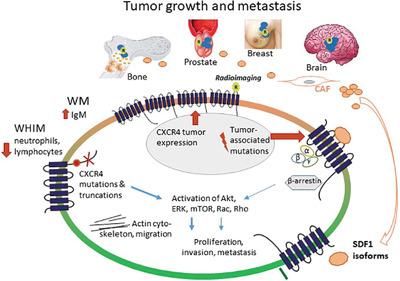当前位置:
X-MOL 学术
›
J. Leukoc. Biol.
›
论文详情
Our official English website, www.x-mol.net, welcomes your
feedback! (Note: you will need to create a separate account there.)
At the Bench: Pre‐clinical evidence for multiple functions of CXCR4 in cancer
Journal of Leukocyte Biology ( IF 3.6 ) Pub Date : 2020-10-26 , DOI: 10.1002/jlb.2bt1018-715rr Gary D Luker 1 , Jinming Yang 2 , Ann Richmond 2 , Stefania Scala 3 , Claudio Festuccia 4 , Margret Schottelius 5 , Hans-Jürgen Wester 6 , Johann Zimmermann 7
Journal of Leukocyte Biology ( IF 3.6 ) Pub Date : 2020-10-26 , DOI: 10.1002/jlb.2bt1018-715rr Gary D Luker 1 , Jinming Yang 2 , Ann Richmond 2 , Stefania Scala 3 , Claudio Festuccia 4 , Margret Schottelius 5 , Hans-Jürgen Wester 6 , Johann Zimmermann 7
Affiliation

|
Signaling through chemokine receptor, C‐X‐C chemokine receptor type 4 (CXCR4) regulates essential processes in normal physiology, including embryogenesis, tissue repair, angiogenesis, and trafficking of immune cells. Tumors co‐opt many of these fundamental processes to directly stimulate proliferation, invasion, and metastasis of cancer cells. CXCR4 signaling contributes to critical functions of stromal cells in cancer, including angiogenesis and multiple cell types in the tumor immune environment. Studies in animal models of several different types of cancers consistently demonstrate essential functions of CXCR4 in tumor initiation, local invasion, and metastasis to lymph nodes and distant organs. Data from animal models support clinical observations showing that integrated effects of CXCR4 on cancer and stromal cells correlate with metastasis and overall poor prognosis in >20 different human malignancies. Small molecules, Abs, and peptidic agents have shown anticancer efficacy in animal models, sparking ongoing efforts at clinical translation for cancer therapy. Investigators also are developing companion CXCR4‐targeted imaging agents with potential to stratify patients for CXCR4‐targeted therapy and monitor treatment efficacy. Here, pre‐clinical studies demonstrating functions of CXCR4 in cancer are reviewed.
中文翻译:

实验室:CXCR4 在癌症中多种功能的临床前证据
C-X-C 趋化因子受体 4 型 (CXCR4) 通过趋化因子受体发出信号,调节正常生理学的重要过程,包括胚胎发生、组织修复、血管生成和免疫细胞运输。肿瘤利用许多这些基本过程来直接刺激癌细胞的增殖、侵袭和转移。CXCR4 信号传导有助于癌症中基质细胞的关键功能,包括肿瘤免疫环境中的血管生成和多种细胞类型。对几种不同类型癌症的动物模型的研究一致证明了 CXCR4 在肿瘤发生、局部侵袭以及淋巴结和远处器官转移中的重要功能。来自动物模型的数据支持临床观察结果,表明 CXCR4 对癌症和基质细胞的综合影响与超过 20 种不同人类恶性肿瘤的转移和总体不良预后相关。小分子、抗体和肽类药物已在动物模型中显示出抗癌功效,引发了癌症治疗临床转化的持续努力。研究人员还在开发伴随 CXCR4 靶向显像剂,有可能对患者进行 CXCR4 靶向治疗分层并监测治疗效果。本文综述了证明 CXCR4 在癌症中功能的临床前研究。
更新日期:2020-10-26
中文翻译:

实验室:CXCR4 在癌症中多种功能的临床前证据
C-X-C 趋化因子受体 4 型 (CXCR4) 通过趋化因子受体发出信号,调节正常生理学的重要过程,包括胚胎发生、组织修复、血管生成和免疫细胞运输。肿瘤利用许多这些基本过程来直接刺激癌细胞的增殖、侵袭和转移。CXCR4 信号传导有助于癌症中基质细胞的关键功能,包括肿瘤免疫环境中的血管生成和多种细胞类型。对几种不同类型癌症的动物模型的研究一致证明了 CXCR4 在肿瘤发生、局部侵袭以及淋巴结和远处器官转移中的重要功能。来自动物模型的数据支持临床观察结果,表明 CXCR4 对癌症和基质细胞的综合影响与超过 20 种不同人类恶性肿瘤的转移和总体不良预后相关。小分子、抗体和肽类药物已在动物模型中显示出抗癌功效,引发了癌症治疗临床转化的持续努力。研究人员还在开发伴随 CXCR4 靶向显像剂,有可能对患者进行 CXCR4 靶向治疗分层并监测治疗效果。本文综述了证明 CXCR4 在癌症中功能的临床前研究。































 京公网安备 11010802027423号
京公网安备 11010802027423号